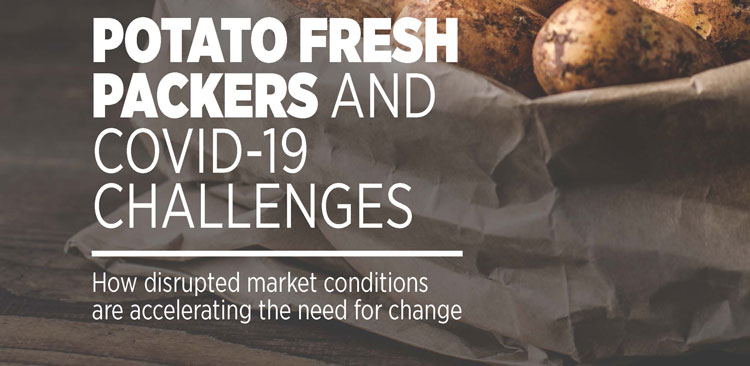Tomra Food has published a new e-book to help potato fresh packers tackle operational challenges intensified by the COVID-19 pandemic. The 19-page publication, downloadable free-of-charge from the company’s website, offers information and advice which will be helpful to packhouses not only now, while market conditions are distorted, but also long after the pandemic has passed.
The e-book starts by acknowledging that the damage inflicted on the potato industry by COVID-19 is not even-handed. While many potato growers and processors have suffered because of loss of demand from foodservice outlets, other growers and packers are thriving because retail sales of fresh pack potatoes have been boosted by the increased frequency of home-cooking. The eBook reports how the monetary value of potato sales at multiple-outlet supermarkets quickly increased by 67%.
The e-book welcomes the fact that consumers have rediscovered fresh potatoes, but also asks whether this newfound fondness will last. Surveys report that a majority of consumers expect to continue cooking more at home after the pandemic, and 63% of Millennials say they will keep on eating the comfort foods they have enjoyed during lockdowns. Even if this should not prove to be the case, the global consumption of fresh potatoes is rising: the growing numbers of people earning middle-class incomes in developing eastern nations, where rice is the traditionally favored staple, are acquiring more varied tastes influenced by western-style diets.
Keeping up with demand by increasing throughputs is the biggest challenge many packhouses have faced during the pandemic. Though this is understandable, the e-book observes that it is also unfortunate: when big potato retailers find that their regular suppliers cannot deal with greater volumes, they look elsewhere for help, and business that gets steered away doesn’t always come back. Another demand-related challenge is the need to take advantage of the opportunity to gain new business, yet some packers lack the operational systems, line technologies, or people power to do this.
Difficulties recruiting and retaining manual labor, familiar to packhouses for years now, have also been intensified by the pandemic. Fewer people are willing to do this kind of work. In developed nations, most unskilled laborers prefer the security of permanent employment to seasonal contracts; in developing nations, manual laborers are now finding they have more desirable jobs to choose from. Many packing businesses consequently rely on temporary foreign workers, but because of pandemic-related travel restrictions, in many places this pool of labor has dried up.
A copy of the e-book, titled ‘Potato Fresh Packers and COVID-19 Challenges’, can be downloaded here.


